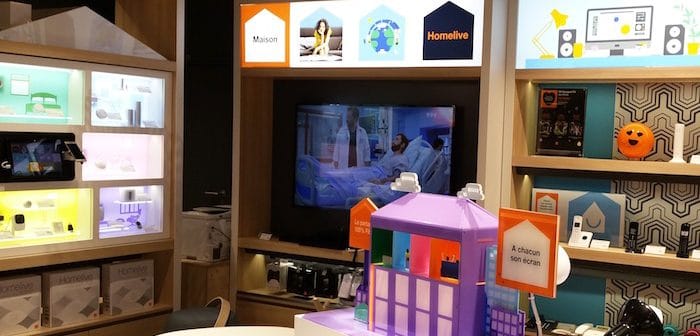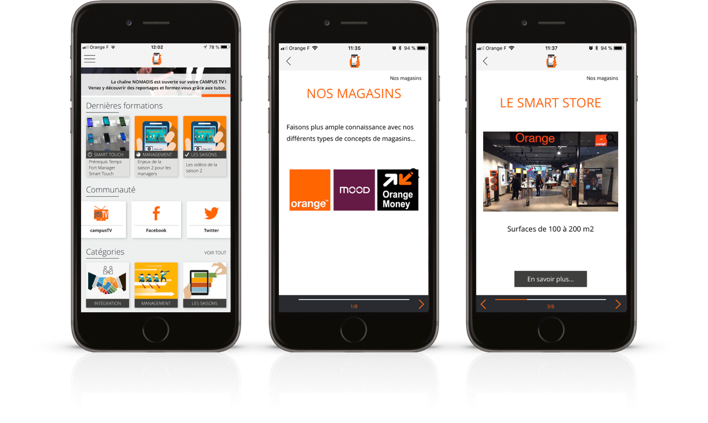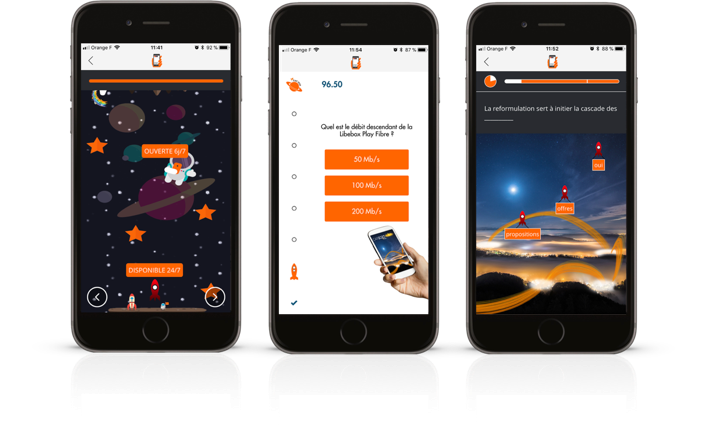Générale de Téléphone, a wholly-owned distribution subsidiary of Orange, is active in the telecoms and photography sectors (distribution of products, accessories and services for mobile telephony/Internet and Orange telecommunications), through a network of brick-and-mortar retail outlets and an e-commerce site.
Training is a key pillar of corporate culture. “The right to professional development is one of the element’s of the company’s “10-point employee promise”. And the digital revolution that Générale de Téléphone has fully embraced also means that it makes perfect sense to be looking to new ways of learning.
From a Learn on Mars testbed course to Teach on Mars Enterprise portal: a resoundingly conclusive field test
It all started four years ago. In 2014, Bruno Chantepie, Head of the Digital Expertise Centre, introduced the first mobile learning project at Générale de Téléphone. Bruno explains: “We decided to go with Teach on Mars, one of the pioneers of mobile learning and the leading player in the French market.” This particular Learn on Mars course was on fibre technology. A year later, a second Learn on Mars programme on insurance for mobile phones was introduced, followed by a Quiz on Mars. At the time, the team was supported by Jérôme Wargnier, a consultant at Alberon Partners, and his advice on mobile learning best practice proved invaluable. “Instilling good habits around the authoring of course content is essential when you launch this kind of mobile learning initiative.”
The introduction to mobile learning was overwhelmingly positive: “The principle appealed to our sales consultants and managers and they all really embraced the idea. Access was initially restricted to in-store demonstration phones, and then extended to the Android business phones we provide to our employees. Huge numbers of sales staff installed the app on their business mobiles. The scale of the take-up impressed us and was a clear indicator of the enthusiasm with which employees were adopting the Teach on Mars approach.”
After the first two trial run projects, the Teach on Mars sales team introduced Générale de Téléphone to the new Teach on Mars Enterprise portal. “We were convinced that It was the way to go to make our training programmes more easily accessible to our sales staff and centralise them in a single application,” explains Bruno Chantepie. The new extended portal went live in November 2017.
Mobile learning: innovative and yet completely natural
According to Bruno, the mobile learning approach is both «innovative and yet a completely natural learning system when your business is selling mobile phones. Our employees are just like our customers – they use their phones constantly. Shorter formats mean sales staff are much more able and likely to build the training into their daily routine effectively, and the push notifications have made it easy for us to communicate directly with our learners.” Bruno firmly believes this approach is “less static and top-down than the e-learning mode. This is the learning format for today and tomorrow.”
The Générale de Téléphone team has been experimenting with an e-learning platform since 2010. But the approach has been complex to implement, with modules coming from the parent company and other phone manufacturers intrinsically longer in format. “It’s not so suitable for in-store use because we need to plan for long periods away from the store so that employees can take the modules. The logistics and planning are problematic, especially with larger teams.” Bruno believes “the star of e-learning is waning because the format hasn’t evolved since 2004 and it offers limited interactivity.”
As a result, Générale de Téléphone is shifting to a strategy where mobile learning is the main training tool complementing face-to-face courses. The e-learning option will remain in use for a few more years to cater for specific modules that lend themselves to the channel.
An effective solution for reaching the widest target population in record time
The Générale de Téléphone network consists of around 220 stores (Orange Money, MOOD and Orange GDT), and covers the whole of France. 1800 employees are scattered throughout the country in stores and support centres (regional offices and headquarters).
In this kind of highly decentralised organisation, “it costs money to move employees around and e-learning is complicated to implement and lacking in appeal,” says Bruno. Instead, the key focus now for the company is quite literally “to put our learning and development offer right in the palm of the hand of our store personnel. We’re looking for optimum efficiency and user appeal, and we want to reach as many of our people as possible in record time”. With these requirements, the company sees a mobile learning platform that can be accessed via mobile phone – just as easily as on a tablet or a PC – as a very relevant and effective solution for their digital L&D programmes.
Mobile-only content: playing the exclusivity card
The Générale de Téléphone strategy includes making some topics available exclusively on mobile phones and offering others in a blended learning format. “It’s important to create a sense of exclusivity by making certain topics accessible via mobile only,” says Bruno. For example, the course on fibre and the onboarding programme for new employees, which is mirrored by a learning programme for their managers, are on the mobile platform only. Conversely, because of legal requirements, topics such as banking must be delivered on other channels.
Step-by-step deployment
Four months after launch, initial feedback from users on the mobile learning portal was very positive. “The tool meets our needs: it’s easy, fun and user-friendly. The formats are spot-on in that they don’t take too long to complete. Everyone can track their progress and the new skills acquired.” On the design side, the solution has also been well-received, content authors lauding the “ease of development of new modules, where – in terms of format at least – it’s simply a matter of completing Excel spreadsheets. Reporting features help keep track of work done and anything outstanding.”
Intermediate targets have been set with the goal of reaching 95% deployment by the end of this year. The team has given itself 12 months to ramp up the project and this is a pivotal year. The team’s focus now is “to expand the training catalogue with new topics such as sales techniques, management, products and so on, with the aim of offering around fifteen courses by the end of the year and thirty in the mid-term. This will further reinforce take-up and adoption of the tool.” A digital coordinator will soon be introduced in each region, tasked with regional promotion and coordination of the fully deployed “Digital Campus”, thus helping embed mobile learning habits and reach the 95% deployment target.
- Think about the project well in advance, get plenty of advice and take advantage of experience-sharing events such as Teach on Mars’ SkyLab.
- Back your project up with a carefully-devised launch and communication strategy. “You have to be punchy and innovative in your communication and make the learning programme as attractive as possible. Use humour to arouse interest and boost adoption by employees.”
- Turn your local managers into ambassadors and sponsors, because “the store managers are the ones who will be driving and monitoring adoption of mobile learning by the employees.”
- Create a sense of occasion and exclusivity: “mobile-only courses are key!”.

Cornélia a enfilé sa tenue de cosmonaute en 2017. Après 5 années au service des clients de Teach on Mars en tant que Customer Success Manager, Cornélia prend une nouvelle trajectoire en pilotant les projets de communication & marketing, ses premiers amours, toujours avec l’ambition d’explorer la galaxie !





![[Mobile Learning Awards] Spotlight on Le Bon Marché, winner of the Native Training Award, best practice guide](https://www.teachonmars.com/wp-content/uploads/2024/03/Visu_BestPracticesGuide1-1-400x250.png)
![[Mobile Learning Awards] 2023 Edition – A summary of best practices and innovative ideas](https://www.teachonmars.com/wp-content/uploads/2024/03/Visu_BestPractices-1-400x250.png)
![[Mobile Learning Awards] Spotlight on Maisons du Monde, the ‘Engagement’ award’s Jury’s Favourite – a best practices guide!](https://www.teachonmars.com/wp-content/uploads/2023/05/MLA2022-VisuelsUseCae_EN_5-400x250.jpg)